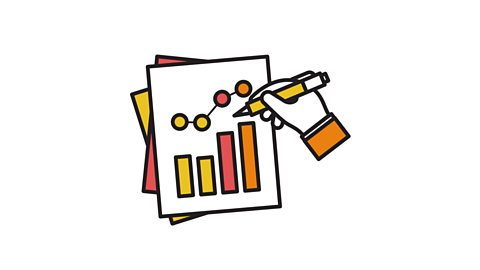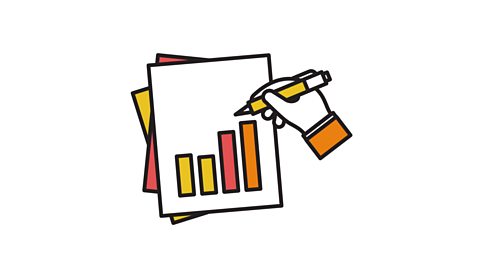
Experiments answer scientific questions
A good scientific question often needs a test or experiment to find out the answer. An example is: Do more birds come to the garden or park if you put food out for them?
To answer this question you would need to count the number of birds when you have put food out for them and again when you hadn’t and compare your results.

Recording findings
You can record findings from tests and experiments in different ways:
- drawings
- labelled diagrams
- keys
- bar charts
- tables
- tally tables.
Scientists often record observations from experiments like this in a tally chart.
Keeping a tally

Tally marks are used for counting things.They are small vertical lines, each one representing one unit. The fifth tally mark in a group is always drawn across the first four - as this makes it easier to count the total in groups of five. How many birds were counted in these tally marks?
Using a tally chart is easier than writing numbers each time or counting in your head especially if you are counting something that moves quickly like birds.
Watch: Using tally charts
Discover how to record and represent your findings when working scientifically.
Child: So, are there more birds than mammals in the park?
Molly: That’s what I’m trying to figure out.
Ah, a magpie - definitely a bird!
Log that one and load tally table.
Narrator: A great way to record data! A chart would help us to review it though…
Molly: Ok, load chart.
Narrator: This line chart shows the number of birds and mammals over the whole week.
Molly: We can easily see there are more birds.
Where did that magpie go?
Child: Oh!

Representing your findings
Results from a tally chart can then be presented in a table, The size of the bars in a bar chart let us see the sizes of results from tests or experiments. or The segments of a pie chart let us see the sizes of results from tests or experiments., or a graph to make them easier to understand.

Activities
See if you can record and represent findings by trying these activities.
Activity 1: Keeping tallies
Activity 2: Quiz

Collecting data
You will need a pencil and some paper for this activity
Go outside and collect your own set of data and record it using tally marks.
You could record a tally of:
- different trees or flowers you can spot
- different colours of cars
- different birds, insects or animals that you see
Set yourself a time limit of 10 minutes to collect the data.
Once you have collected your data, think about the best way you could represent it.
Are you going to draw a picture, bar chart or pictograph?
What conclusions can you draw from your data?

More on Working scientifically
Find out more by working through a topic
- count1 of 3

- count2 of 3
